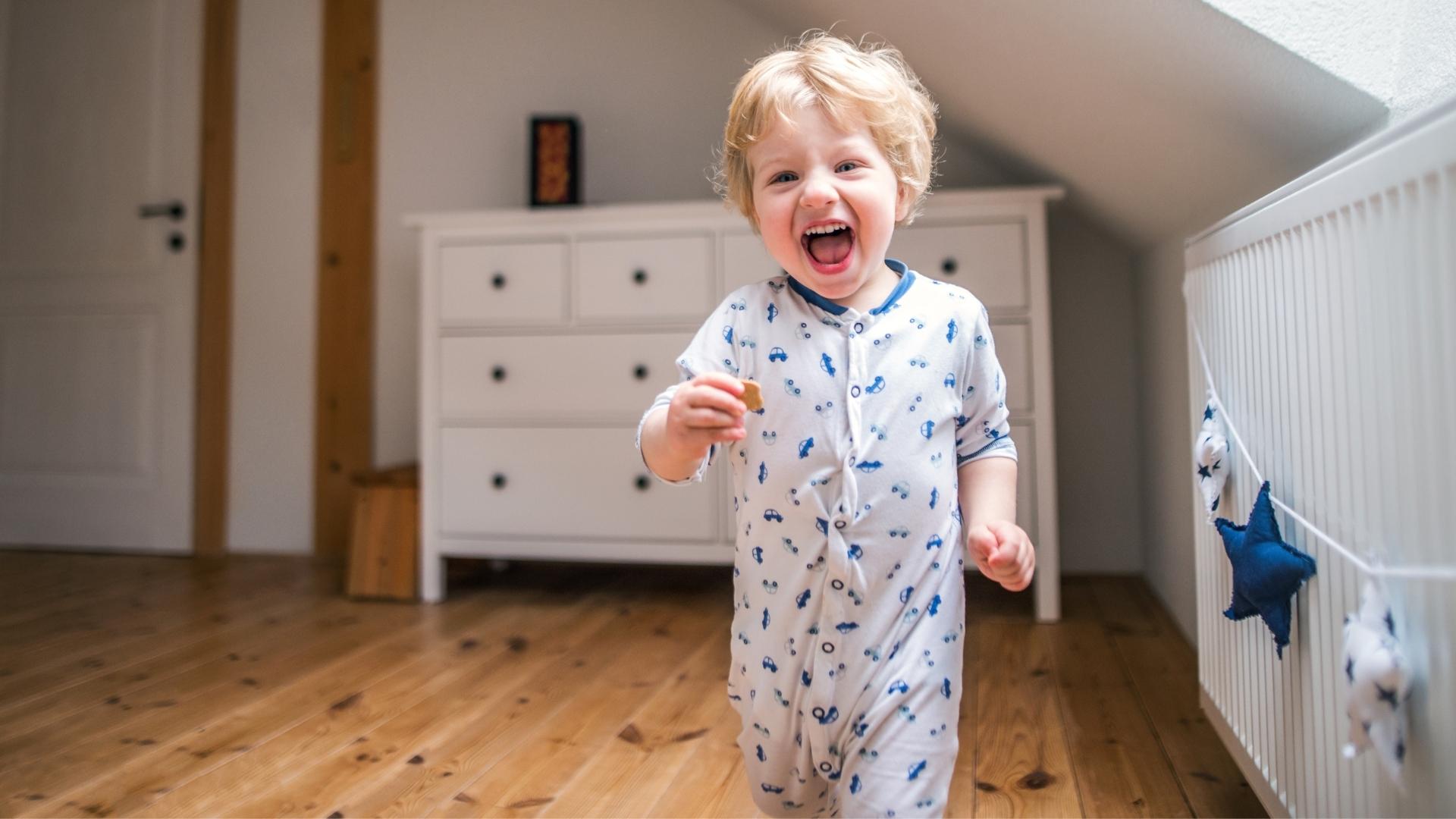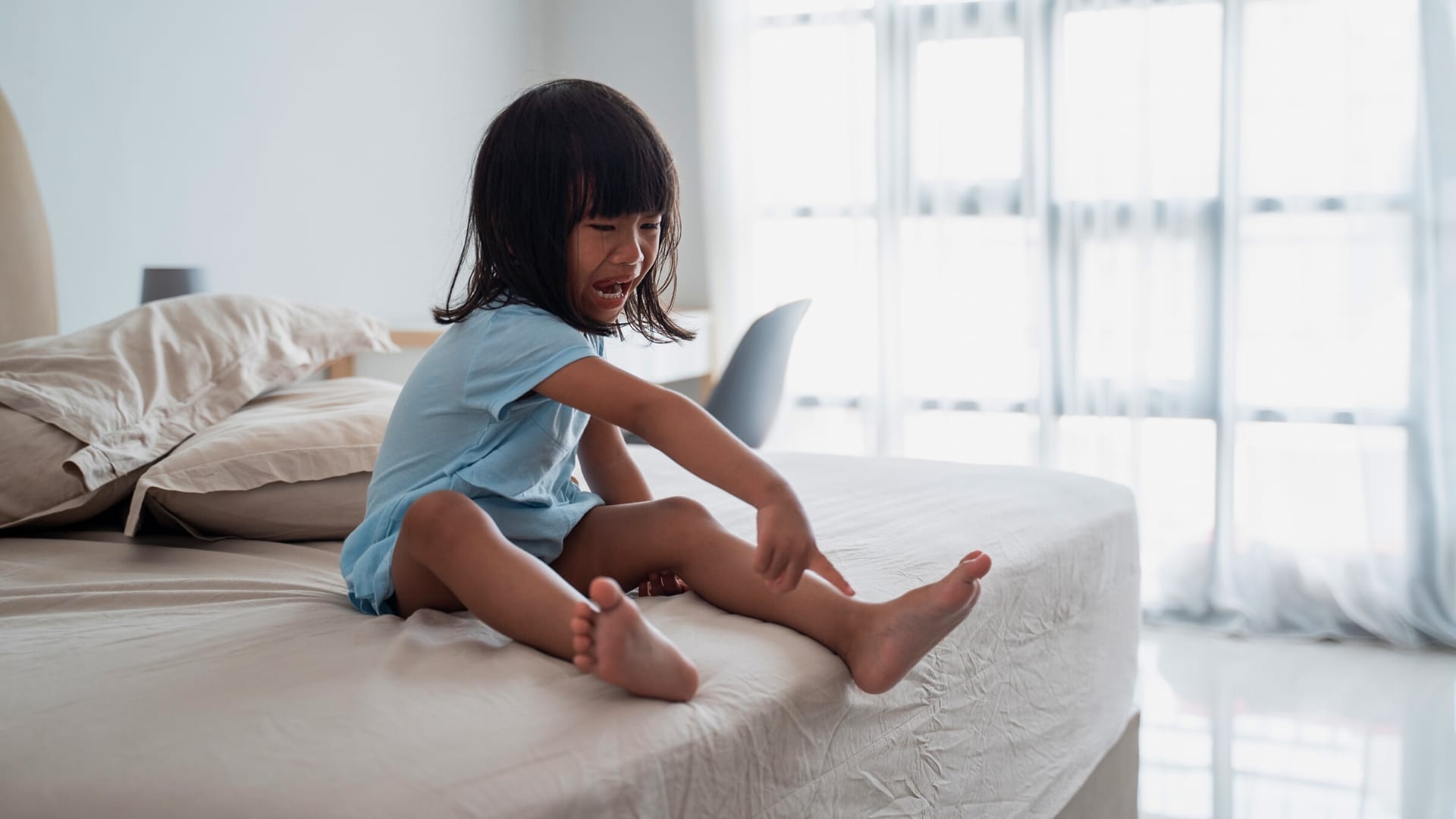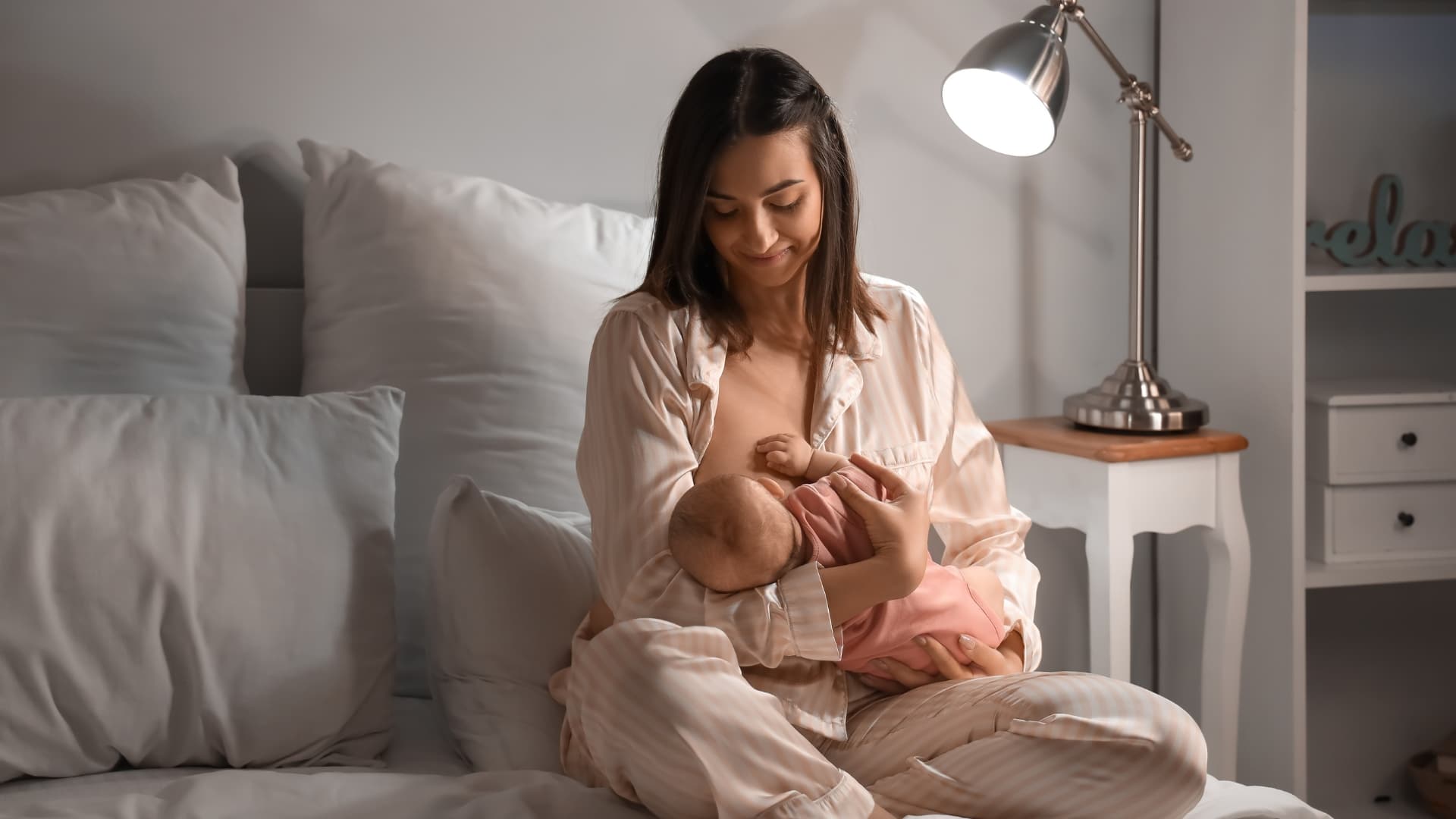Babies are known for their array of sounds. From grunting to gurgling, crying, burping, and whining, your little one can be very loud! And if your baby is a noisy sleeper it can naturally be quite worrying.
So in today’s article, I will share with you what these noises are, why they happen, and what sleep noises you need to listen out for that indicate a more serious underlying issue.
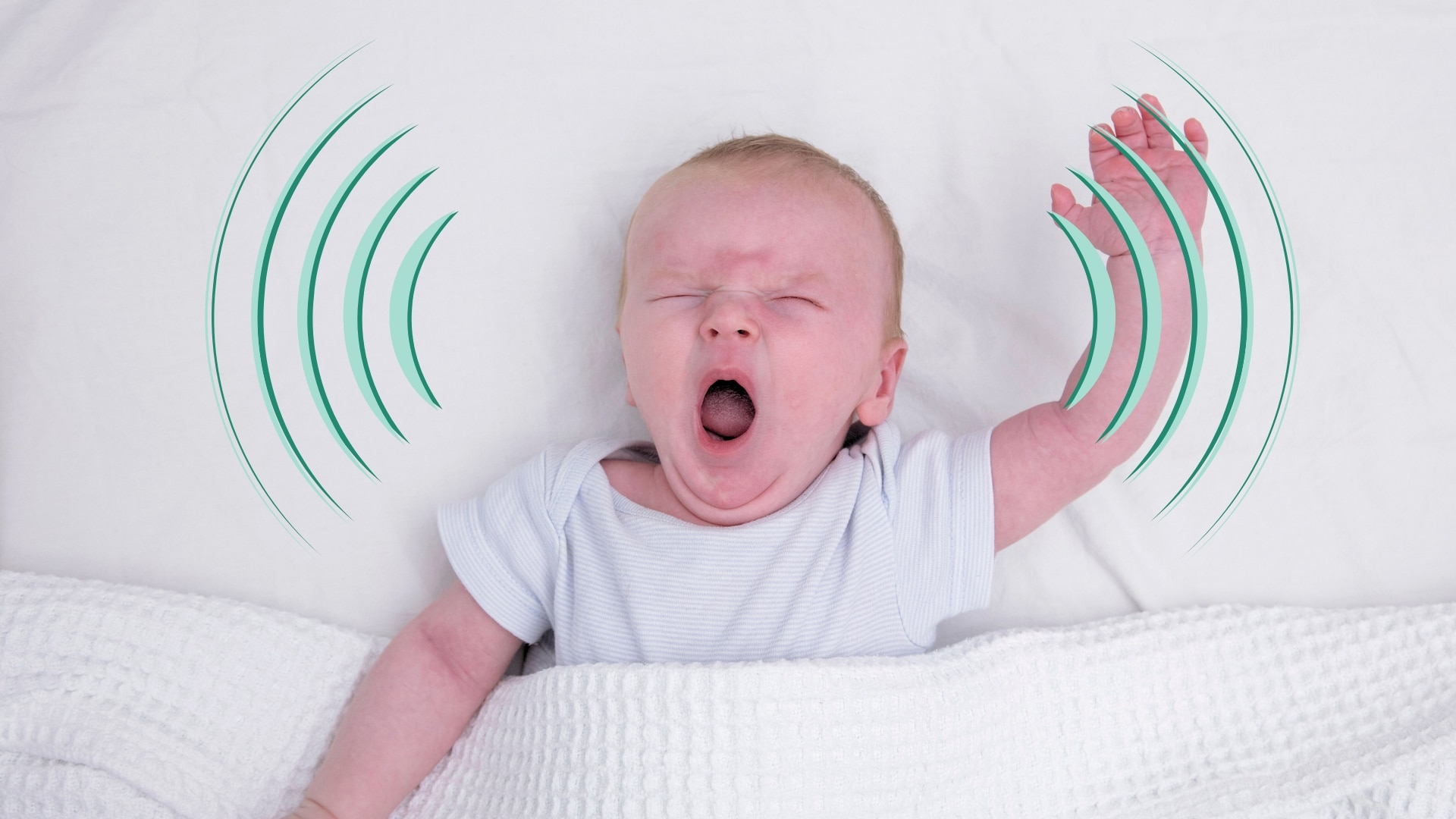
Table of Contents
Why Do Babies Make Noises When They Sleep?
First things first… the question we’re all thinking… Why do babies make noises when they sleep?
The answer comes down to the fact that your baby’s respiratory system is still developing and the grunts and snorts you hear are from your baby learning to regulate their breathing patterns.
There’s also the possibility of digestive sounds joining the symphony. As your baby’s digestive system is in action, you might hear gurgling, groaning, or hiccupping as they sleep too.
These sounds are simply your baby processing breast milk or formula.
Rooting noises, which are sounds associated with looking for a breast or bottle, can also be heard if your baby begins to stir between sleep cycles.
You might even notice whistling or rattling, which can be due to the flow of air through baby’s narrow nasal passages.
Is It OK If My Baby Is A Noisy Sleeper?
You may now be wondering if it’s OK that your baby is a noisy sleeper… And 99.9% of the time, yes, it’s perfectly normal and OK for your baby to be a noisy sleeper and exhibit a range of sounds.
In the next section, I will outline the normal sleep sounds babies make… and later in the article, I will talk about the sounds you need to be concerned about (click here to jump to that section).
As babies grow, especially past the 6-month mark, these sleep sounds tend to decrease.
REMEMBER: You should always place your baby on their back to sleep. This position can reduce the risk of SIDS and is still the recommended position, even if it results in louder breathing sounds.
Typical Newborn Sleep Sounds
Newborns breathe more rapidly than adults, and their breathing patterns can include periods of regular, deep, and calm breathing followed by periods of sharp, rapid, and disjointed breathing.
This means your baby’s breathing may slow down or pause for a few seconds and then start up again. While this can be alarming, it is a normal part of baby’s active sleep.
Combined with these breathing patterns, here are the most common newborn sleep sounds:
- Snuffles: The presence of mucus in the nasal passages can cause your baby to make a congested sound while sleeping.
- Whistling: As babies have narrower nasal passages compared to adults, it can lead to whistling noises when they breathe.
- Grunts: These noises are often related to baby’s effort to move air through their passages.
- Short Pauses in Breathing: Known as periodic breathing, common in newborns.
- Soft Cries or Whimpers: These likely occur as your baby cycles through sleep phases.
Remember, while most newborn sleep noises are typical, you should always monitor your baby for any signs of distress or ongoing breathing difficulties. Trust your instincts and seek medical advice if something doesn’t seem right.
NOTE: Retractions, where you see your baby’s chest pulling in with each breath, should not be seen. If you notice these, it’s important to consult a pediatrician as it can be a sign of RSV.
What Is Active Sleep?
Active sleep, commonly referred to as REM (Rapid Eye Movement) sleep, is a light sleep when dreams occur and the eyes move rapidly back and forth. It is also a phase characterized by shorter sleep cycles, restless sleeping, and irregular breathing.
During this stage, your baby’s body may occasionally twitch, and they may grimace their face. Newborns sometimes exhibit behaviors such as lip-smacking or sneezing too. These can be easily mistaken for waking cues but they are quite normal during REM sleep.
Most of a newborn’s sleep is spent in active sleep, transitioning to more adult-like sleep cycles around the age of 3-5 months.
As your baby grows, the amount of active sleep will decrease.
It is essential to understand that active sleep is a normal part of your baby’s sleep routine. It supports their brain development and is a phase where a lot of memory consolidation happens.
How Long Does Newborn Active Sleep Last?
Roughly 50% of newborns spend their sleep time in active sleep.
This stage is vital to their sleep habits, as it’s linked to processing experiences and brain growth.
A typical newborn sleep cycle lasts 50 minutes and they will spend roughly 24-25 minutes of this in active sleep.
Bear in mind that every newborn is unique, and active sleep duration can vary.
Active sleep often results in noisy sleep and is part of a newborn’s natural sleep habit. It should not be a cause for concern unless it’s coupled with other signs of distress.
When Do Babies Stop Having Active Sleep?
As they grow older, your baby’s sleep starts to mature. By the time they are 3 months old, the ratio of active sleep begins to decrease.
From 6 months onwards, the structure of a baby’s sleep starts resembling that of an adult. The noisy, light sleep stages give way to quieter, deeper sleep phases.
However, it’s important to remember that all babies are different. Some might transition to quieter sleep earlier, while others might take a bit longer.
Looking to get your little one to sleep quickly and effortlessly? Check out my Bedtime and Nap Cheat Sheet and master the art of making daytime naps and bedtimes as seamless as possible.
A bedtime & nap cheat sheet so good your little one will ask you to put them to bed...
Laura Williams "This is a life saver! I'm so glad I downloaded your bedtime & nap cheat sheet. My little one actually asked me to put him to bed last night! Unbelievable! Thank you so much!"
Click Here For The FREE Cheat Sheet
Should I Ever Be Concerned About My Baby Making Noises While Sleeping
As we have established babies make a range of sounds during sleep, for various reasons. And as a new parent, you may find these sounds both charming and concerning.
While these sounds are not generally a cause for worry and usually signal a healthy, active sleep cycle…. There are some important signs to watch out for, when the noise may indicate something more serious:
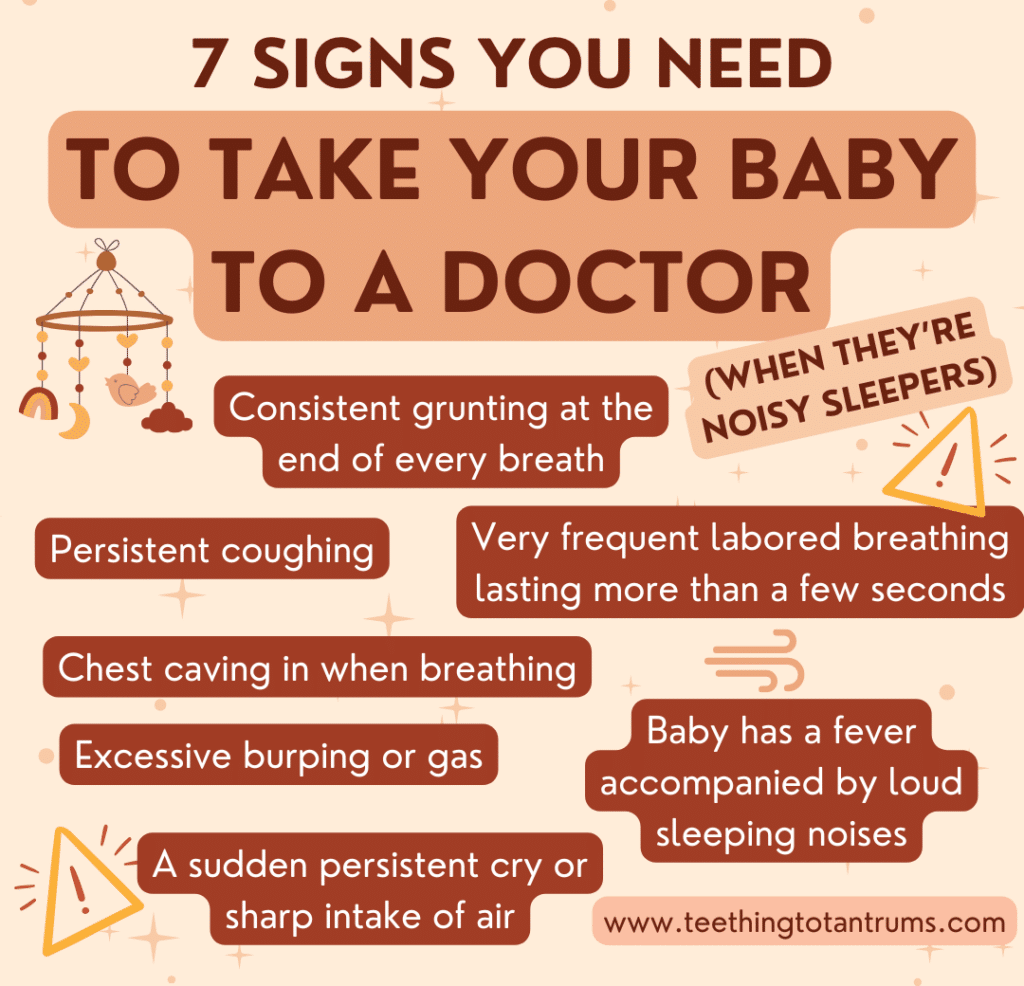
- Labored Breathing: If you notice your baby’s breathing is consistently rapid, labored, or involves wheezing, it could indicate respiratory distress. Remember, while it is normal for young babies to have short periods of rapid breathing, these periods should not:
- Last for more than a few seconds
- Be more rapid than 60 breaths per minute
- Occur very frequently ie repeatedly during a short nap.
- Consistent grunting at the end of every breath: This could be a symptom of respiratory distress as baby forces breath in and out.
- Chest caving in when breathing. Watch this video from The American Academy of Pediatrics for a visual guide.
- Persistent Coughing: A cough here and there is typical, but persistent coughing could be a sign of a respiratory condition like asthma or an infection.
- Fever: Should your baby feel unusually warm or have a fever, they may need medical attention. This is especially true if noisy sleep is combined with other symptoms like lethargy or irritability.
- Excessive Burping or Gas: Frequent burping or noisy gas may suggest digestive discomfort. If it’s accompanied by recurrent fussiness or spitting up, it might be acid reflux.
- Other Vocalizations: Listen for any acute changes in the sounds your baby makes. A sudden, persistent cry or a sharp intake of air are cues to check on them. NOTE: Laryngomalacia is a common cause of noisy breathing in infants but typically resolves without treatment.
NOTE: Regardless of the noise your baby is making, if you notice any of the following while they are sleeping, you should seek urgent medical help:
- A bluish coloration to their skin
- Signs of illness like bronchiolitis (runny nose, fever, stuffy nose, loss of appetite and cough)
- Visible muscle contractions in your baby’s chest or neck
- Nostril flaring with each breath
- Long pauses where your baby stops breathing (more than 10 seconds)
- Baby is lethargic despite sleeping a lot
Frequently Asked Questions About Noisy Sleepers
In this section, you’ll find answers to common concerns about the various sounds infants make during sleep. These insights help you understand what’s normal and when you might need to consult a pediatrician.
Q: Why does my newborn grunt and squirm while sleeping?
A: It’s typical for newborns to grunt and move during sleep. This happens as their bodies learn to regulate breathing and digestion. Occasional grunting is due to immature abdominal muscles required for defecation. If grunting is accompanied by squirming, it usually means your newborn is transitioning between sleep cycles. Persistent, severe grunting might require medical attention.
Q: What causes my baby to make whimpering noises during sleep?
A: Whimpering noises during sleep are often a result of your baby’s active sleep cycles. Dreaming occurs during these cycles, which can cause a variety of sounds. Whimpering is usually harmless, but if your baby sounds distressed, they might need comfort or a diaper change. Should whimpering become constant and disrupt sleep, discuss it with your pediatrician for peace of mind.
Q: Is it normal for a baby to make humming noises while sleeping?
A: Yes, babies often make humming or buzzing noises in their sleep. These sounds can be part of their normal breathing pattern. Nasal passages are narrow, and vibrations can occur, especially if there’s mild congestion. It’s generally not a cause for concern unless there are signs of respiratory distress or difficulty in breathing, which should be evaluated by a healthcare provider.
Q: How can I differentiate between my baby being awake and in active sleep?
A: Active sleep in babies can look similar to awake periods, with movements and noises. During active sleep, babies might twitch, smile, or jerk suddenly. Their eyelids might flutter, and they could seem partly awake. If your baby is calm and not crying, they’re likely just in active sleep. Gently check if they respond to light touches or sounds to see if they’re awake.
Q: What are the best practices when my baby is in active sleep?
A: When your baby is in active sleep, it’s best to avoid waking them. Provide a safe sleep environment: a firm mattress, no loose bedding, and place them on their back. Monitor noises and movements from a distance, allowing them to cycle through sleep stages. If they seem restless but not distressed, try to let them self-soothe back to deep sleep.
Q: What does it mean when a 6-month-old moans in sleep?
A: Moaning or other vocalizations in a 6-month-old can indicate they’re in a phase of deep or active sleep. It might be a result of dreaming or settling into a comfortable position. Continual moaning with signs of discomfort might require a check for illness, teething, or a dirty diaper. If the moaning becomes a sleep disruption, consulting with a pediatrician could be beneficial.
Q: Is my baby having a night terror?
A: While night terrors are rare in babies, they can occur in toddlers and older children. In babies, other causes might explain nighttime distress such as pain or teething, so observe and consult your pediatrician if these episodes are frequent and concerning.
Need More Parenting Help?
- Download our FREE Bedtime & Nap Sleep Cheat Sheet. It’s a free, easy-to-use and proven formula designed for parents of 0-5 year olds to master the art of consistently undisturbed and restful sleep without the yelling, nagging or exhausting long-winded evenings.
- Check out our Parenting Toolbox. You’ll get access to expertly-chosen products that you can guarantee are the best for your little one and your wallet.
- Are you looking for personalized guidance to navigate the challenges of parenting? I offer 1-on-1 consultations to bring you tailored strategies and actionable advice to help support your child's growth and well-being with confidence.

A bedtime & nap cheat sheet so good your little one will ask you to put them to bed...
Laura Williams "This is a life saver! I'm so glad I downloaded your bedtime & nap cheat sheet. My little one actually asked me to put him to bed last night! Unbelievable! Thank you so much!"
Click Here For The FREE Cheat Sheet
